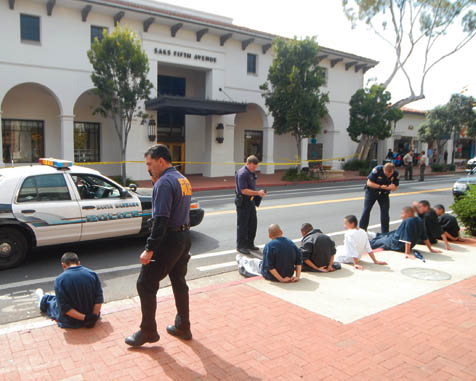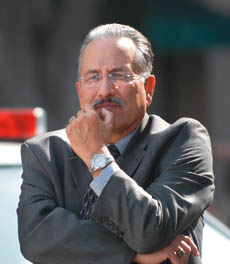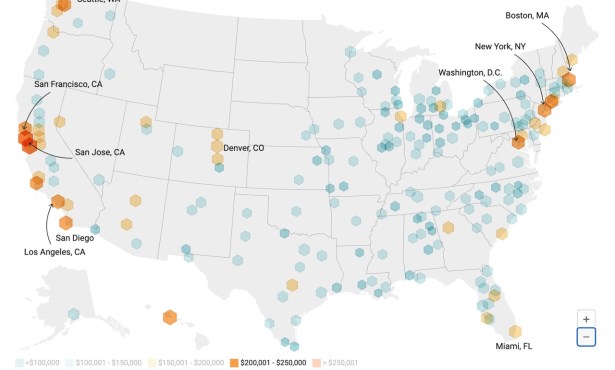Police Chief Cam Sanchez Explains the Law’s View on Gangs
The Strategist

S.B. Police Department Chief Cam Sanchez was raised in East Los Angeles and has been in police work for 27 years, the last seven of those in Santa Barbara. He has strong feelings about gangs and quite a bit of insight into that lifestyle. Sanchez consented to sit down and talk with Martha Sadler for the better part of an hour about gangs in Santa Barbara. What follows is an edited transcript of that conversation.
What has prompted the recent spate of juvenile stabbings and killings? Gangs have been around since the late 1800s in California, including here in Santa Barbara, and this continues to be a tragic thing. Now, they are getting younger and younger, as you’ve seen in the last two murders we’ve had. They’ve been 14-, 15-, 16-year-old children. : Last year, we didn’t have a homicide; this year, we had two. That is horrible, but in terms of amount of crime and the amount of youth involvement in gangs, it’s been about the same for the past five to 10 years. The degree of violence among these very young people has escalated, but not the amount.

To what degree are these teenage gangs tied to prison gangs? In some cities that’s an issue, but I don’t think it’s an issue here in Santa Barbara County.
Are the gangs here organized around finance, like drug dealing? Or are their turfs purely geographical? It’s still a territorial thing. The strange thing is we are talking about young people who are from the same country, if not this one, and are of the same ethnicity. They are basically the same economically, and they have the same struggles. But instead of helping out each other, they’re fighting, even killing each other, and all because they landed on one side or the other of State Street. Yet sometimes we wonder why we can’t get further ahead. Well, here’s one of the reasons: because we’re not working together-we’re working against each other, we’re victimizing each other, and that is just amazingly tragic to me.
Are there gang members who are not violent? Absolutely. They’re in it for different reasons-the camaraderie, the sense of family.
What about the nicknames a lot of Latino kids have? The 16-year-old who was murdered was known as Nemo, for example. Are those necessarily gang monikers? It could be a nickname, it could be a gang moniker, it could be both. In my day, as a kid growing up, we all had nicknames; that didn’t mean we were gang members. When it escalates to violence and young people losing their lives, that’s when we need to shake our head and ask, “What are we doing?” We have to remember it’s not just a gang thing; it’s a youth violence issue. And the percentage that is causing us the most problems is small.
What percentage? I’m talking one or two percent who are causing us 90 percent of our problems. People like to say it’s an economic thing. Well, no, it really isn’t. It’s a choice. There are so many young people in Santa Barbara who are economically disadvantaged and who respect their parents. They go to school and stay in school, they don’t cut class, and they don’t choose a gang lifestyle. There are plenty of positive activities to get involved in, and plenty of opportunities for these young people, and a lot of them are taking advantage of it.
What are the parents of the violent gang members like? Well, I don’t know all of them, obviously, but I’ve met a lot whose children are involved in gang fighting who have lost a little control, if not all. They could be a single parent. They might not have a lot of opportunity to give a lot of attention to their kids because of the several jobs they have. All of that plays into it. A lot of these parents are struggling to guide their children and they feel embarrassed that their son or daughter has taken this direction. Sometimes it’s just a lack of knowledge about where to turn. And then there are other parents who are in complete denial. They won’t admit their child has made a very unfortunate decision, even when we show them the evidence.
Fear plays into it, I suppose. Besides the fear of having your children stabbed on the street, there’s the fear of having them taken away by the authorities. Yes, and you know, when a young person decides to become involved in a gang, what they don’t think about is they drag their families in with them. We know where that teenager lives, so now we have to go do a search warrant. And here we are, waking up people early in the morning, getting them out of bed, searching their homes, basically violating them right there in their own home. I know you and I would both feel that way. I’ll tell you, I’ve been at several recently where the parent walked up to me and said, “Chief Sanchez, I want to apologize for the actions of my son.” And yet, it’s not their fault; it’s their child who has made a very bad choice and basically pays nothing for the goodness of that home. But even worse than the cops knowing where you live, so do the other gang members. We’ve had siblings assaulted, as a message.
What is it about the combination of Mexican and U.S. cultures? You have the parents-so many of them hardworking, traditional, religious, family-oriented-and then they come to the U.S. and their children create pretty much the same gang scene all over, California to Chicago. Yeah, well, I have a lot of family in Mexico, and people think they get here and they become gang members here, but interestingly enough, there are a lot of gangs in Mexico and they are a lot more violent than they are here.
Is it village versus village? It’s not a cultural thing. You go back to the Italian mob, back in the day. You have the Aryan brotherhood, you have the Latino gangs, you have Asian gangs, you have the African-American gangs. It has absolutely nothing to do with culture, because culture is not criminality. Criminality is a choice. When you think about it, there are a lot of great families out there and some have folks in their family who make choices that aren’t good ones. You go to the Franklin Center, you have parents who are consciously patrolling, for lack of a better word, their own community. There are a group of men who only speak Spanish who meet on Monday nights at Franklin School, who have parenting classes. But see, we don’t read about that.
What is the best prevention, for parents? Parents need to get involved. There are a lot of kids out there who say, “My dad’s always working.” Well, be grateful. “My dad’s never home.” Well, find out why. You know, there are so many things we as parents can do better, but sometimes the young people have to be told, taught, and trained to know there’s a reason your dad is working so many jobs. My dad worked a lot of jobs, but the time he spent with us was quality time. He didn’t have a lot of it, but he always gave us the best of it, and I think the parents need to be told that they need to spend some time with their kids, and they need to encourage them to stay in school.
You told the City Council that as long as you are chief, there will be no gang injunctions. Why not? My [officers] do such a phenomenal job that I do not believe we have lost control of this thing. I think if we continue to focus on the small percentage that causes the majority of the problems, and come after them with everything we’ve got, I do not see the reason for a gang injunction. I’m sure there are instances where a gang injunction does work, but in most cases, it doesn’t.
What exactly is a gang injunction anyway? Would you have to arrest kids walking home together from the Police Activities League? I don’t think it would come to that, but technically speaking, you’re saying this certain community is a known gang community, and therefore kids of a certain age cannot congregate. We’re not there yet.
Don’t injunctions target kids wearing gang clothes? Yeah, and to me, it’s not about the clothing or the hair or what they drive. : It has to do with just committing a crime. I know a lot of young people who dress differently than others because they like to dress that way, and they have great hearts and they do good things.
Or they dress the same, in a kind of gang uniform. I’ve seen kids who buy their clothes at a very expensive store and look great, and who commit crimes and do and sell narcotics. So to me, it’s not about the dress. It’s about the heart; it really is. There’s nothing in the law that says you can’t hang around on a certain street corner and dress in the same way as everybody else on that corner. There’s nothing wrong with that. But what it does do [is it] places you in harm’s way. And when you make those choices, you have to know that.
What is a gang associate? A kid who may not be fully into gangs but he hangs out with them. They’re friends.
Do you see anything wrong with that? I think so. It’s like choosing a team, and I think we have to look at it like that. They know who they’re getting involved with, there’s no secret they are gang members, and if you decide to be one of their pals, then automatically-whether or not you’re a gang member-you’re going to be seen as one.
But it could be their brother or cousin; you might not be able to avoid them. That’s true, too.
Are you worried about Fiesta? We’re not worried about Fiesta at all. We had a homicide, we’re working [on] it, but is that going to change how we address Fiesta? No. We’re going to approach Fiesta the same way we do every year to make sure everyone has fun, is safe, and gets home.


